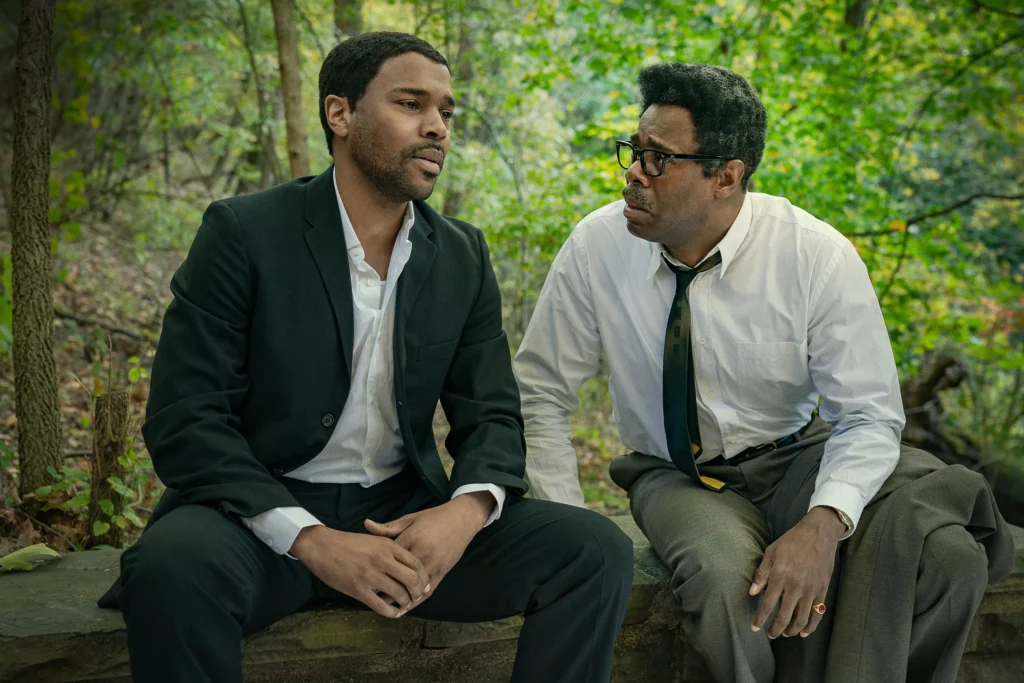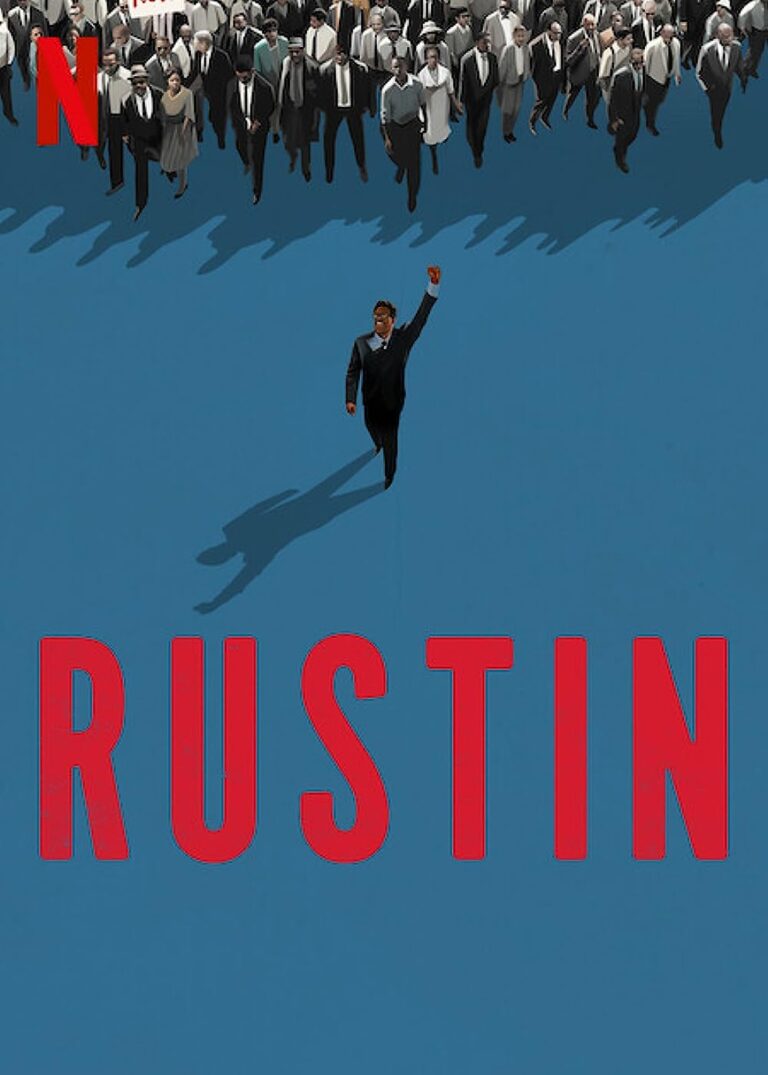Rustin – Snapshot
Rustin – about Bayard Rustin, the gay Black man who, almost by himself, organized the quarter-million person 1963 Civil Rights March on Washington – is a fatally flawed and very ordinary biopic. Watch it for Colman Domingo’s performance or don’t watch it at all! (3*)
Where to Watch:
Stream: Netflix
Rent: (Nowhere)
Rustin – The Oscar Buzz
Oscar Nominations (1) / Oscar Wins (0) :
Leading Actor (Colman Domingo)
Rustin is a biopic of Bayard Rustin, a gay Black man who is best known as the organizer of the hugely successful 1963 March on Washington where Martin Luther King Jr. delivered his famous “I Have a Dream” speech. The movie is the first feature film produced by the partnership between Netflix and the Obamas (Higher Ground). Before this one, the Obamas were mostly interested in documentaries and, as I suggest in the last section, I think this movie might have been more successful as a documentary. President Barack Obama gave Rustin a posthumous Medal of Freedom.
Colman Domingo, playing the title role Bayard Rustin, received Rustin’s only Oscar nomination. As a college professor on several campuses and married to another man, Domingo brings a comprehensive understanding to the Rustin character and charges his performance with sensitive grace and quick intelligence. His nomination is well earned. We last saw Domingo just last week in another movie with an almost entirely Black cast, The Color Purple. He also starred in Lincoln, Selma, and If Beale Street Could Talk.
If there is one movie that serves as Rustin’s genetic source, it would be Ma Rainey’s Black Bottom (20). George C. Wolfe directed both features; Glynn Turman, who played A. Philip Randolph, Bayard Rustin’s strongest and unfailing supporter, acted in both films; and production designer Mark Ricker worked both of them. Additionally, the famed jazz musician Branford Marsalis scored the music for both films. Ma Rainey’s Black Bottom did better at the Oscars, though, winning for Costumes and Makeup/Hairstyling,and received nominations for Production Design as well as Leading Actress (Viola Davis), and Leading Actor (Chadwick Boseman). In my review of the earlier movie I noted that it “is an intriguing movie, with lots of important thoughts and emotions regarding race in America and plenty of good music. But it isn’t the best movie you’re going to see this year.”
A couple of other creatives deserve special mention. Rustin’s screenplay derives from two writers, Julian Breece and Dustin Lance Black, both of whom have more experience in TV than in feature films – and I’ve written many times about how TV experience does not yield movie greatness. Black, however, did win the Original Screenplay Oscar for Milk (08), the ,poor about the gay San Francisco activist who was assassinated at his desk. Film Editor Andrew Mondshein was nominated for his work on The Sixth Sense (99). Jeffrey Wright – who was also nominated for leading actor in this year’s American Fiction – plays Adam Clayton Powell, the powerful New York City congressman. Comedian Chris Rock takes the role of the NAACP leader and Rustin antagonist, Roy Wilkins.
Rustin – Related Movies
Ma Rainey’s Black Bottom (20) (Direction; Musical Score; Production Design; Turman)
Milk (Screenplay)
Beauty and the Beast (17)/ Lone Survivor/ Dreamgirls (Cinematography)
The Sixth Sense (Film Editing)
Bombshell (Production Design)
Black Panther: Wakanda Forever/ Coming 2 America (Makeup/Hairstyling)
The Color Purple/ If Beale Street Could Talk/ Selma/ Lincoln (Domingo)
American Fiction/ The Batman/ No Time to Die/ French Dispatch (Wright)
Rustin – What Others Think
Both the viewing public and the critical community ranked Rustin about the same, in the bottom quarter of this year’s Oscar nominees ranking around 30 out of all 38 films. Viewer headlines included “A great story to tell but an ordinary movie” and “Incredible person, conventional biopic.”
Critics were a little more specific, but also found Rustin lacking, ranking 30th out of all 38 movies. Nearly everyone raved about Colman Domingo’s performance and lauded the movie’s attempt to tell a story that isn’t well known. Peyton Robinson (RogerEbert) said “Domingo is excellent as Rustin. He’s charismatic, gritty when he needs to be, and wildly intelligent.” Later he writes “with a stale approach to its plot line and confused narrative priorities, the film is more like an educational outline than a spirited story.”And Robert Daniels (also RogerEbert) noted “Colman is stuck in an Oscar vehicle without windshields, doors, or a steering wheel.” Later in his review Daniels wrote that “Domingo ultimately clings to these emotional crescendos, gripping for dear life to a film that rarely, if ever, rises to his level.” Manohla Dargis (New York Times) summed up Domingo’s acting “it’s such a lucid, persuasive, outwardly effortless performance that you may not even notice he’s carrying this movie almost by himself.”
Rustin – Special Mention
Bayard Rustin – was born in 1912 in West Chester, Pennsylvania. He was effectively raised by his grandparents and believed for some time that his biological mother was actually his older sister. He attended Wilberforce University, Cheney University, and City College of New York. Rustin was a member of the USA Communist Party in the 1930s.
In 1941, he worked closely with A. Philip Randolph to organize a March on Washington movement (smaller than the 1963 effort) to successfully end racial discrimination in defense industry employment and in the military. He maintained his ties to Randolph and organized labor and, as you see in the movie, was able to use those links to further his civil rights aims. He later led the A. Philip Randolph Institute, an arm of the AFL-CIO. He also worked with Martin Luther King Jr. to establish the Southern Christian Leadership Conference. It is suggested that King derived much of his anti-violence civil rights strategy from Rustin’s beliefs. Rustin’s links with both men are important in the movie.
Rustin was also a gay man and served 60 days in jail after being arrested in Pasadena for sexual activity in a parked car with two men in 1953. That incident is also raised in Rustin.
Rustin – Michael’s Moments
Rustin is a biopic and, honestly, I have mixed feelings about biopics. On the one hand, we are led to believe that what we are seeing is a true representation of a person and important events. But, on the other hand, because it isn’t labeled as a “documentary”, the filmmakers have creative license to introduce elements of their own, even to distort the subject’s portrayal in subtle ways that could possibly mislead the viewer. And, because there is no obligation on the filmmakers to identify before hand what is fact, what is fiction, and what might be a combination of both, there are no proper boundaries between entertainment and education.
It is true, of course, that even a documentary can present a distorted picture. Important facts can be ignored, testimony of key people can be omitted. But in errors of omission there is always the opportunity to point out the gap – the missing facts or opinions – in order to critique the film and achieve a balanced picture. But many biopics, especially these days, are guilty of errors of commission, where people or events are introduced that aren’t real and aren’t true and, therefore, create a misleading impression.
In Rustin, the major error of commission is in the character of Elias Taylor, played by Johnny Ramey, a youngish star with a promising future. The problem is that Taylor is a totally fictional character introduced into the film as a sort of catch-all person to symbolize all the potential gay, younger men that Bayard Rustin might have been sexually interested in. Rather than identify a single person or even a specific set of real sexual interests, the filmmakers decided to combine them all into a single person and give that person a wife and a role as a southern black preacher to paint a picture of Black gayness that was bold and somewhat sinister as a center of religious corruption. But if there had been such a character as Taylor, would Martin Luther King Jr. have ever been as open to partnering with Rustin in the 1963 Civil Rights March on Washington? Quite possibly not, but because the movie can’t explore that issue, without tearing the script to shreds, it ends up throwing the whole movie into a disjointed mess. By introducing an unreal but important character into the dynamics, the situation loses its clarity.
We may get an intuitively better appreciation of Rustin, but we lose on understanding his effect on other people and, therefore, the power of the movie is significantly reduced. I believe this may explain why the other actors all seem to pale compared to Rustin’s emotional and intellectual brilliance. Martin Luther King Jr. (Aml Ameen) is totally unconvincing in this film and does not fit our usual conception of the man. Adam Clayton Powell (Jeffrey Wright) is appropriately obnoxious, reflecting a metropolitan political snobbery, but he is also vapid and washed out. Chris Rock’s Roy Wilkins always seems like he is about to break out in a roaring Saturday Night Live joke – not the demeanor of the extremely important civil rights leader that he was.
Clearly, Colman Domingo’s brilliant performance as Rustin is a key part of the problem. As a gay Black man, Domingo brings a clarity to his understanding of Rustin that would not be appreciated by many other actors. In our previous movie this year, The Color Purple, Domingo demonstrated his ability to be mean and nasty. But here he takes on unexpected nuance, moving from emotions of rejection when his resignation is accepted to moments of tear-jerking pride when he is praised on national television by the same man (MLK)! Domingo was also able in his language and demeanor to assemble the intelligence that must have been the foundation for Rustin’s entire existence. Domingo clearly earned the nomination and quite possibly should have won the Oscar. (Although I’ve noted that I always think the best performance is the one I’ve just seen, so…!)
But regardless of Domingo’s performance, not because of it, Rustin doesn’t work as a movie. As many other critics point out it is truly just “ordinary”. The script is probably the biggest failure. Aside from a quote or two from Rustin – which he may or may not have actually said – nobody else really has any interesting or powerful things to say. The writers, in cahoots with the director, created a film where they focused on a single character missing the fact that everyone lives in a network of personalities. And, instead of finding ways of exploring his life in his real network, they created a fictional character and threw so much of their creative power at him, that they forgot the rest of the real world.
Watch Rustin for Colman Domingo’s performance or don’t watch it at all. (3*)


